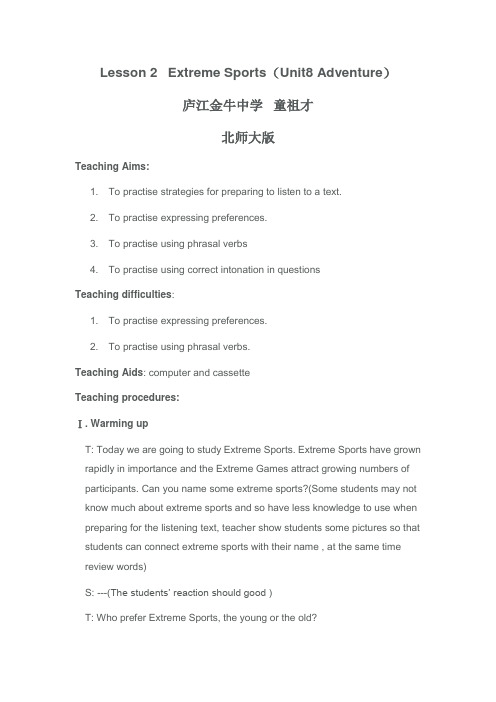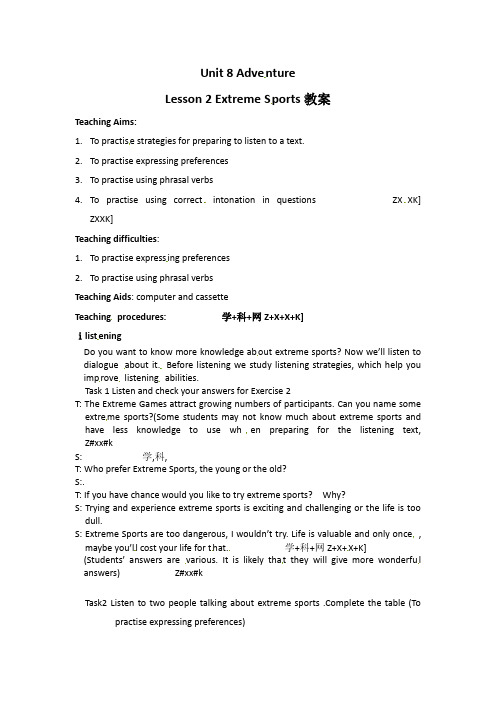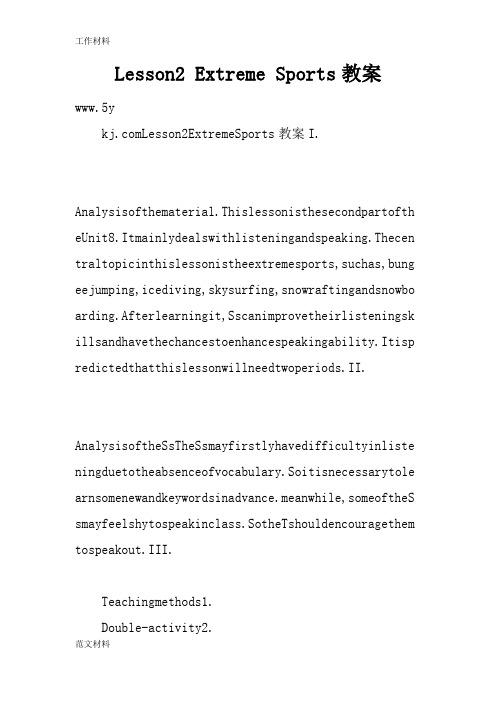Lesson 2 Extreme Sports上课学习上课学习教案
- 格式:doc
- 大小:14.50 KB
- 文档页数:4

I. 知识目标:1.Review the words of lesson1.2. Learn some new words and its usage.II. 预习检测:1._________adj. 极度的,极端的→_________n.极端,极度→_________adv.极度地,极端地,非常【答案】extreme, extreme, extremely2.__________ n.相似性,类似性→_________adj. 相似, 类似【答案】similarity, similar3.__________adj.各种各样的→_________n.不同种类,各种各样【答案】various,variety4._________n.配备,设备→_________v.配备,装备【答案】equipment, equip5._________n.较喜欢的东西,偏爱→_________v. 偏爱,比较喜欢【答案】preference,preferIII. 情境导入:Ask some students to do some exercises to review the language of last period and let the students read the new words and learn the new words.IV. 核心单词:1.extreme adj. 极度的,极端的n.极端,极度~sports ____________ ~ lift-wing / right-wing views ______________n. •go to ~s____________=take st h. to ~s. ‚in the~s____________adv.极度地,极端地,非常~ly~ly important/ useful/ complicated ___________________________________她发现找工作极其困难。

X-sports 极限运动 Time Allotment of the Unit Six teaching periods are needed to cover the whole unit, among which students will have a series of Section One: About X-sports 感知极限A. ObjectivesStudents will be able to:1. be familiar with the English names related to X-sports and its facilities.2. master the techniques to express preferences in English.3. acquaint students with the knowledge of X-sports and X-sports clubs.4. write an application letter in simple words.5. practise plosives.B. Teaching ProceduresStep One: Starter — Various X-sportsA. Refer to the Info Box and explain the relationship between X-sports and extreme sports:“X ” in X-sports actually stands for “extreme”.B. Have students look at the pictures of various extreme sports and match them with the givennames.C. Check the answers with students.D. If necessary, the teacher can offer more examples of the English names for X-sports.Step Two: What are your favorite X-sports?A.Have students listen to the tape or CD and write down all the expressions that mean “bepart of the sports activities”, which include “take part in, go in for, go skiing, go skateboarding…”B.Have students listen to the tape or CD and fill in the blanks.C.Have students listen to the dialogue again and check the answers with students.anize a discussion among students on the following questions:a What kinds of sports are called extreme sports?b Do you like extreme sports? Why or why not?c Why do many people go in for extreme sports?1. I go in for skiing. 我喜欢滑雪。

Lesson 2 Extreme Sports(Unit8 Adventure)庐江金牛中学童祖才北师大版Teaching Aims:1.To practise strategies for preparing to listen to a text.2.To practise expressing preferences.3.To practise using phrasal verbs4.To practise using correct intonation in questionsTeaching difficulties:1.To practise expressing preferences.2.To practise using phrasal verbs.Teaching Aids: computer and cassetteTeaching procedures:Ⅰ. Warming upT: Today we are going to study Extreme Sports. Extreme Sports have grown rapidly in importance and the Extreme Games attract growing numbers of participants. Can you name some extreme sports?(Some students may not know much about extreme sports and so have less knowledge to use when preparing for the listening text, teacher show students some pictures so that students can connect extreme sports with their name , at the same time review words)S: ---(The students’ reaction should good )T: Who prefer Extreme Sports, the young or the old?S: The old.T: If you have chance would you like to try extreme sports? Why?S: Trying and experience extreme sports is exciting and challenging or the life is too dull.S: Extreme Sports are too dangerous, I wouldn’t try. Life is valuable and only once, mayb e you’ll cost your life for that.(Students’ answers are various. It is likely that they will give more wonderful answers)Ⅱ. ListeningDo you want to know more knowledge about extreme sports? Now we’ll listen to dialogue about it. Before listening we study listening strategies, which help you improve listening abilities.Task 1 Listen and check your answers for Exercise 2Task 2 Listen to two people talking about extreme sports .Completethe table (To practise expressing preferences)Task 3 Listen again. Complete the Function File with the followingwords (To practise and consolidate expressing preferences)Ⅲ. SpeakingDo the exercise 6:Use these words to write sentences about your preferences ⅣVocabulary phrasal verbsDo the exercise7, 8Ⅳ. Pronunciation: Intonation in QuestionsListen to the questions below. In which of them does the intonation go up at the end?After the student give the answers listen again and repeat the questions together. Then ask them “Do you find out the “rule” about intonation in questions?”Guide student’s to come to the conclusion:The rising intonation is used in questions that can be answered by ‘yes/no’.The falling intonation is used in question-word questions, i.e. beginning with ‘wh-’Ⅴ. Speaking and ListeningDo the exercise 10 firstly in pairs, use the questionnaire to interview your partner. Secondly Comparing Cultures listen to a person talking about sports in theUSABritainand answer these questionsⅥ. HomeworkExercise 7。

Unit 8 AdventureLesson 2 Extreme Sports教案Teaching Aims:1.To practise strategies for preparing to listen to a text.2.To practise expressing preferences3.To practise using phrasal verbs4.To practise using correct intonation in questions ZX XK]ZXXK]Teaching difficulties:1.To practise expressing preferences2.To practise using phrasal verbsTeaching Aids: computer and cassetteTeaching procedures: 学+科+网Z+X+X+K]ⅰlisteningDo you want to know more knowledge ab out extreme spor ts? Now we’ll listen to dialogue about it. Before listening we study listening strategies, which help you improve listening abilities.Task 1 Listen and check your answers for Exercise 2T: The Extreme Games attract growing numbers of participants. Can you name some extre me sports?(Some students may not know much about extreme sports and have less knowledge to use wh en preparing for the listening text, Z#xx#kS: 学,科,T: Who prefer Extreme Sports, the young or the old?S:.T: If you have chance would you like to try extreme sports? Why?S: Trying and experience extreme sports is exciting and challenging or the life is too dull.S: Extreme Sports are too dangerous, I w ouldn’t try. Life is valuable and only once, maybe you’l l cost your life for t hat. 学+科+网Z+X+X+K] (Students’ answers are various. It is likely tha t they will give more wonderfu l answers) Z#xx#kTask2 Listen to two people talking about extreme sports .Complete the table (To practise expressing preferences)Task3 Listen ag ain. Complete the Function File with the following words (To practise and consolidate expressing preferences) 学科ⅢspeakingDo the exercise 6 Use these words to write sentences about your preferencesⅣVocabulary phrasal v erbsDo the exercise7,8 Z&xx&kⅤPronunciation: Intonation in QuestionsListen to the questions below. In which of them does the intonation go up at the end? ZxxkAfter the student give the answers listen again and repeat the questions together. Then ask them “Do you find out the “rule” ab out i ntonation in questions?”学科Guide student’s to come to the conclusion: The rising intonation is used in questions that can be answered by ‘yes/no.’.The falling intonation is used in question-word questions, i.e. beginning with ‘wh-’学科Ⅵspeaking and listening ZXXK]Do the exercise 10 firstly in pairs, use the questionnaire to interview your partner. Secondly Comparing Cultures listen to a person talking about sports in the USA Britain and answer these questionsⅦHomework ZXXK]Exercise 7 学。

公开课教案执教内容:Lesson 2 Extreme Sports 执教教师:李旭阳执教班级:高一(18)班2015年5月19日Unit8 Lesson2 Extreme Sports教案I.Analysis of the material.This lesson is the second part of the Unit 8. It mainly deals with listening and speaking. The central topic in this lesson is the extreme sports, such as, bungee jumping, ice diving, sky surfing, snowrafting and snowboarding. After learning it, Ss can improve their listening skills and have the chances to enhance speaking ability. It is predicted that this lesson will need two periods.II.Analysis of the SsThe Ss may firstly have difficulty in listening due to the absence of vocabulary. So it is necessary to learn some new and key words in advance. Meanwhile, some of the Ss may feel shy to speak in class. So the T should encourage them to speak out.III.Teaching methods1.Double-activity2.Ss-central teaching method3.Group work and individual workIV.Teaching Objectives1.To practice strategies for preparing to listen to a text.2. Use expressions to talk about preferences3. To understand the meaning of doing sports.V. Teaching difficulties1.To practise expressing preferences2.To practise using phrasal verbsVI.Teaching key points1. To practise strategies for preparing to listen to a text. VII. Teaching Aids: computer and cassetteStep 1. Lead-in1.T asks Ss to watch a vedio of extreme sports.2.T asks Ss to look at the pictures of extreme sports and learn some key words.Key words:bungee jumping, ice diving, sky surfing, snowboarding, snowrafting, white-water rafting.设计意图:复习已学过的词汇,并引导学生说出做极限运动的好处,使学生关注运动。

Lesson2 Extreme Sports教案www.5yLesson2ExtremeSports教案I.Analysisofthematerial.Thislessonisthesecondpartofth eUnit8.Itmainlydealswithlisteningandspeaking.Thecen traltopicinthislessonistheextremesports,suchas,bung eejumping,icediving,skysurfing,snowraftingandsnowbo arding.Afterlearningit,Sscanimprovetheirlisteningsk illsandhavethechancestoenhancespeakingability.Itisp redictedthatthislessonwillneedtwoperiods.II.AnalysisoftheSsTheSsmayfirstlyhavedifficultyinliste ningduetotheabsenceofvocabulary.Soitisnecessarytole arnsomenewandkeywordsinadvance.meanwhile,someoftheS smayfeelshytospeakinclass.SotheTshouldencouragethem tospeakout.III.Teachingmethods1.Double-activity2.Ss-centralteachingmethod3.GroupworkandindividualworkIV.Teachingobjectives1.Topractisestrategiesforpreparin gtolistentoatext.2.Topractiseexpressingpreferences3 .Topractiseusingphrasalverbs4.Topractiseusingcorrec tintonationinquestionsV.Teachingdifficulties1.Topractiseexpressingpreferences2.TopractiseusingphrasalverbsVI.Teachingkeypoints1.Topractisestrategiesforpreparing tolistentoatext.2.Topractiseusingcorrectintonationi nquestionsVII.TeachingAids:computerandcassette第一课时FirstPeriodStep1.Lead-in1.TasksSstolookatthepicturesofextremesportsandthinkof thebenefitsfromdoingextremesports.2.Findsomeoftheseextremesportsinthephotos.Thekeywords mayhelpyou.keywords:bungeejumping,icediving,skysurf ing,snowboarding,snowrafting,white-waterrafting.设计意图:复习已学过的词汇,并引导学生说出做极限运动的好处,使学生关注运动。
2Extreme Sports教学指导Objectives■ To practise strategies for preparing to listen to a text.■ To practise expressing preferences.■ To practise using phrasal verbs.■ To practise using correct intonation in questions.Resource usedCassette.Possible problemSome students may not know much about extreme sports and so have less knowledge to use when preparing for thelistening text.BackgroundExtreme sports have grown rapidly in importance and theExtreme Games attract growing numbers of participants.Other extreme sports include: ice canyoning (sliding down canyons), street lugeing (going down a street very fast on a board with wheels), underwater hockey (played underwater in a swimming pool), extreme mountain biking (riding mountain bikes off cliffs).Quote: George Orwell was a journalist and novelist whose most famous books were 1984 and Animal Farm. Both books attacked totalitarian government and the way it destroys individual freedom and corrupts society.Routes through the material. If you are short of time, set some of the exercises for homework (e.g. Exercises 7 and 8) and omit Exercise 6.. If you have time, do the Option activity.. If you have two lessons for this unit, a suitable natural break is after Exercise 6. Language Power: pages 68-69.ListeningBefore you startExercise 1Key wordsbungee jumping, ice diving, sky surfing, snowboarding,snowrafting, white-water rafting■ Read through the Key Words with the students and have them match the words to the pictures.Exercise 2■ Read through the Listening Strategies with the class.■ Ask students what clues they get about the content of the next listening text from the title of this lesson, the pictures and their own knowledge of the world.■ Give students time to read through the questions and guess the answers before you play the cassette.Listen to learnExercise 3■ Students listen to the cassette and check their guesses.Answers1 a2 b3 c4 a5 b6 b7 c8 cTapescriptPresenter: …and now we’re going to take a look at extreme sports. What exactly are they? How dangerous are they? What makes people risk their lives to do them? Michelle is going to tell us all about them.Michelle: Speed, excitement, danger. You can find all these in the various extreme sports that have become popular in the last ten years or so. Take bungee jumping. You jump off a bridge, like this one I’m standing on now, and you fall and fall, and then, just before you hit the ground or water, an elastic rope pulls you back. Other extreme sports appear just as crazy. Look at this. In sky surfing you jump out of an aeroplane and use a board to ‘surf’ the air, doing gymnastics in mid-air! Amazing. And extreme sports on land can be just as dangerous.Winter sports have always had an element of danger. The new winter sports are even more dangerous. For example snowboarding, which has all the excitement of surfing but on snow, is more dangerous even than skiing. Probably the most dangerous of all the new winter sports is snowrafting. You sit in a rubber boat and sail down a mountain at great speed ?C and you can’t control the boat!Of course, water sports have always been fun. In white-water rafting you sit in a small inflatable raft and go down a river at great speed. Fast flowing mountain rivers are the best. Then there is ice diving, for those people who are absolutely crazy. You put on diving equipment and dive under a frozen lake. And, if that’s not enough, you then try to walk upside down on the ice!Mm, I feel cold just thinking about it.Exercise 4■ Read the entries in the table with the class and check that students understand that ‘would like to’ means that the person has not yet done the sport.■ Play the cassette for students to complete the table.■ Check students’ a nswers by having them make sentences about Carol and Jonathan.AnswersCarol likes bungee jumping; would like to try sky surfing; wouldn’t like to try snowrafting.Jonathan likes skiing/snowboarding; doesn’t like sailing; would like to try ice diving. TapescriptInterviewer: So tell me, Carol, what sort of extreme sports do you do?Carol: I like bungee jumping. It's great, really exciting.Interviewer: But what makes you do bungee jumping?Carol: Well, I get nervous, you know. But when I 'm jumping I feel great. It's like being a bird.Interviewer: Really? What about other extreme sports?Carol: Mm, I'd love to try sky surfing, but it's very expensive, you know. Interviewer: Right. Are there any sports you wouldn't try?Carol: I'm pretty adventurous, but even I wouldn't like to do snowrafting. There have been some terrible accidents. But I also don't like dull sports. I hate doing boring sports. Like tennis.Personally, I'd prefer to stay at home.Interviewer: Oh, it's not that bad! Thank you very much, Carol. And now we have another 'extreme' sports fan, Jonathan. Jonathan, what extreme sports do you do? Jonathan: Well, I prefer winter sports. There's something about snow. I love going skiing. And I quite like snowboarding. It's really cool.Interviewer: So, why do you do it?Jonathan: Well, as I said, I'm a snow fanatic. And I love sports where there's speed. I can't stand slow sports. You know, like sailing.Interviewer: What other sports would you like to try?Jonathan: I'd quite like to go ice diving ?C it sounds crazy!Interviewer: Are there any sports you wouldn't like to try?Jonathan: Oh yeah. I can't stand heights. I'd hate to do bungeejumping. It looks absolutely terrifying.Interviewer: It certainly does. Right, Jonathan, thank you very much.Exercise 5■ Give students time to read through the list of verbs and the sentences in the Function File. Ask students if they can remember any of the expressions from the cassette. Point out that the numbering of the sentences follows their order on the cassette and the grammatical columns.■ Play the cassette for students to complete the sentences.Answers1 like2 'd love to try3 wouldn't like4 hate5 'd prefer6 prefer7 love8 quite like9 can't stand 10 'd quite likeExercise 6■ Read through the words and examples with the class.■ Students write six to eight sentences about their preferences. Tell them they can use other sports vocabulary if they wish, e.g. football, squash, basketball. Vocabulary: Phrasal VerbsExercise 7■ Tell students to try and do the exercise first before referring to a dictionary.■ Check students' answers by having them read out the text.Answersstart doing am really interested in arrived not do itdo it as planned wear organise explainExercise 8■ Students use the verbs from the text in Exercise 7 to complete this exercise. Answers1 turn up2 are you into3 has just taken up4 set up5 backed outPronunciation: Intonation in QuestionsExercise 9■ Give students time to read through the questions before they listen to the cassette. Students listen to the cassette to identify if the intonation goes up or down. AnswersThe intonation goes up at the end of sentences 2, 3, 4, 5 and 8.■ Have students work out the ‘rule’ about intonatio n in questions: The rising intonation is used in questions that can be answered by ‘yes /no’. The falling intonation is used in questionword questions, i.e. beginning with ‘Wh-’.SpeakingExercise 10■ Have students read out the questions in Exercise 9, using the correct intonation.■ Students work in pairs, asking and answering the questions about sports.■ Each student then makes two sentences about his/her partner.■ Give students time to read through the questions and predict the answers using t heir general knowledge about sports in the USA and Britain.■ Students listen to the cassette and see if their predicted answers are correct. Answers1 They have to wear helmets and special protective clothes because it is a very physical game and they could get hurt.2 two3 yes4 no5 football6 rugby7 five daysTapescript: see Teacher’s Book, page 31.QUOTE … UNQUOTE■ Read the quote to the class and ask them which sports are ‘serious’ and which are not ‘serious’. Ask them if they agree that se rious sport is like war without the shooting.OptionExtensionIn groups, students work out and write a paragraph describing sports which are popular in their town.The groups can then read out their paragraphs to the class.。
Lesson 2 Extreme Sports教案Lesson 2 Ex教案Teaching Aims:1.To praategaring to la text.2.To practise expressingTo practise using phrasal verbTo practise usingaquTeaching difficulties:1.To practise expressing2.To practise using phrasal verbsTeaching Aids: computer and caTeaching procedures:ⅰlisteningDo you wawwledg e about ex? Now we’ll ldialogue about it. Before listening we study listening strategies, which help you improve listening abilTask 1 Listen andur answxercise 2T: The Extreme Games attract growing numbarticipants. Can you nax?(Some students maw much about exand have less knowledge to use waringlistening tex:T: Wxungld?S:.T: If you have chance would you lx? Why?S: Trying and exxxciting and challengingldull.S: Exare too dangerous, I wouldn’t try. Life is valuable and onlay be you’llur lat.(Students’ answers are various. It is likely that they will give more wonderful answers)Task2 Lwo people talking about exlable (To practise expressing)Task3 Listen agalFunction File wllowing words (To practise and consolidate expressing) Ⅲ speakingDo the exUwords to wabout youⅣ Vocabulary phrasal verbsDo the exⅤ Pronunciation: IntonaQuLqubelow. In wdation go up ad?Audent give the answers listen again and repeat the qugether. Then a“Do you find out the “rule” about intonaquestions?”Guide student’lusion: Tg intonaused in quat can be answered by ‘yes/no.’. The falling intonaused in question-word qubeginning with ‘wh-’Ⅵ speaking and listeningDo the ex0 firstly in pairs, use the questionnaview your padly Comparing Cultures laalking abouUSA Britain and answquⅦ Homewxercise。